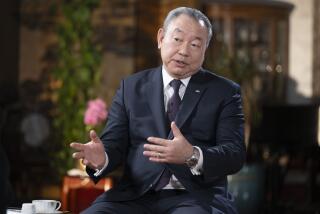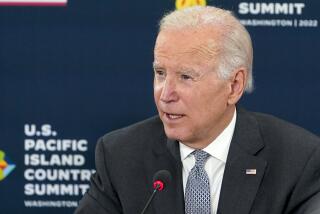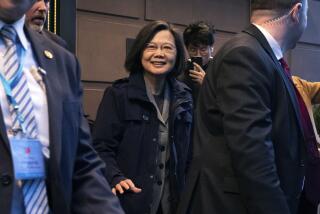Pena to Lead U.S. Delegation to Taiwan
- Share via
TAIPEI, Taiwan — The Clinton Administration announced Tuesday that it will send a Cabinet-level delegation to Taiwan early next month, a move welcomed by authorities here as “an important breakthrough” in relations.
The December visit by Transportation Secretary Federico Pena to attend a U.S.-Taiwan business conference will mark only the second time since 1979 that a Cabinet member has traveled officially to Taiwan, which is formally known as the Republic of China on Taiwan.
It is also the most dramatic evidence yet of the Clinton Administration effort, announced this fall, to upgrade U.S.-Taiwan relations 15 years after withdrawal of diplomatic recognition in favor of the mainland People’s Republic of China.
In 1992, U.S. Trade Representative Carla Hills, a member of the Bush Cabinet, visited Taiwan for the same event that Pena is slated to attend, a meeting of the USA-ROC (Republic of China) Economic Council.
Sources in Taipei said that Pena will be accompanied by senior bureaucrats in the Treasury Department. The Dec. 5-7 meeting of 800 representatives of large American and Taiwanese corporations will also be attended by former President George Bush.
“It is easily the highest-ranking group to come here since 1979,” said a Western observer.
“The decision adequately reflects and enhances the interests of both countries,” Taiwan government spokesman Jason Hu said Tuesday night. “We hope that this is the beginning of a more mature relationship between Washington and Taipei.” Hu described the decision as “an important breakthrough.”
Chen Yu-jun, director of the American Research Institute of Chinese Cultural University, said the Pena visit represents the Clinton Administration’s de facto recognition of Taiwan.
The move is certain to anger authorities in Beijing, where any enhancement of U.S.-Taiwan relations is viewed as a violation of the “one China” principle accepted by the United States in the 1979 Taiwan Relations Act that governs U.S. policy.
Explaining the Administration’s decision, the State Department said in a statement Tuesday night: “The United States recognized the government of the People’s Republic of China as the sole legal government of China in 1979, and since that time we have had unofficial relations with Taiwan. . . . Secretary Pena is traveling to Taiwan at the invitation of the U.S.-Republic of China Economic Council, a private group. The theme of the council’s meeting concerns transportation, so it is appropriate that Secretary Pena participate.”
The announcement also comes only four days before Taiwan’s voters go to the polls in mayoral and gubernatorial elections that have been dominated by the issue of the independence of Taiwan.
“Many Taiwanese are hoping for more international status,” Chen said. “This will show important progress.”
According to the China Economic News Service in Taiwan, Taiwanese President Lee Teng-hui will speak to business leaders at the conference on “opportunities and challenges for using Taiwan as a business operations center by U.S. enterprises.”
Taiwan has emerged as one of the world’s great trading states and the sixth biggest volume trading partner with the United States. Recent democratic reforms have also won support as Taiwan is held up as an example of transformation from a one-party martial law regime to a democracy.
But most relations with major Western countries have been restricted to “unofficial” meetings in restaurants and hotels--even though Taiwan is a first-class economic state with the world’s largest supply of foreign reserves.
Before the Hills visit in 1992, no Cabinet-level official had visited since 1975, when Vice President Nelson Rockefeller attended the funeral of the late president and dictator Chiang Kai-shek.
Times staff writer Jim Mann in Washington contributed to this report.
More to Read
Sign up for Essential California
The most important California stories and recommendations in your inbox every morning.
You may occasionally receive promotional content from the Los Angeles Times.










